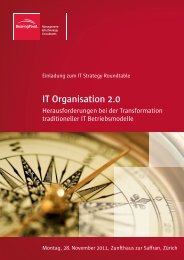Executive summary - BearingPoint
Executive summary - BearingPoint
Executive summary - BearingPoint
You also want an ePaper? Increase the reach of your titles
YUMPU automatically turns print PDFs into web optimized ePapers that Google loves.
4 th Supply Chain Monitor<br />
<strong>BearingPoint</strong><br />
the reconciliation of economical and environmental<br />
motives; progress made thanks to the German law on<br />
renewable energies illustrates this reconciliation.<br />
Looking at the bigger picture about the new challenges<br />
of green Supply Chain: the conditions for a successful<br />
implementation are now gathered!<br />
Motivations to implement green actions<br />
Environmental regulations<br />
Brand image improvement<br />
Innovation (product & processes)<br />
Costs reduction<br />
<strong>Executive</strong> board decision<br />
New markets acquisition<br />
Competitors' pressure<br />
Opinion leaders pressure<br />
Others<br />
0% 20% 40% 60% 80% 100%<br />
Brand image improvement<br />
<strong>Executive</strong> board decision<br />
Environmental regulations<br />
Innovation (product & processes)<br />
Costs reduction<br />
Competitors' pressure<br />
New markets acquisition<br />
Opinion leaders pressure<br />
Others<br />
This is confirmed by the facts, as two thirds of<br />
companies have intensified their green actions over<br />
the past three years. As many consider that green<br />
Supply Chain is a strategic priority.<br />
0% 20% 40% 60% 80% 100%<br />
2008<br />
Significant rise<br />
Significant decrease<br />
2010<br />
Source: <strong>BearingPoint</strong>, Green Supply Chain Monitor, 2010-2011<br />
Green Supply Chain is a strategic priority, immediately or<br />
on the short run (positive answers)<br />
100%<br />
80%<br />
60%<br />
40%<br />
20%<br />
0%<br />
Scandinavia United<br />
Kingdom<br />
& Ireland<br />
* Germany, Switzerland and Austria<br />
GSA * France<br />
Benelux<br />
Source: <strong>BearingPoint</strong>, Green Supply Chain Monitor, 2010-2011<br />
Practically, the conditions of the implementation turn<br />
towards mastering the risks of green Supply Chain.<br />
For some business sectors like large retail players, the<br />
environmental impact of their suppliers accounts for<br />
95%oftheirtotalimpact.Suchgroupsoughttomanage<br />
their exposition to specific risks. Risks can be linked to<br />
the company brand image (atmospheric discharges<br />
due to bitumen sand extraction, deforestation for<br />
palm oil tree plantations,…), compliance issues with<br />
European laws (REACH, RoHS,…) or customers’ health<br />
and potential penalties.<br />
The new guidelines<br />
New directions for green Supply Chain<br />
Beyond the various initiatives that the media daily<br />
present or that were mentioned by the respondents<br />
of the survey, environmental strategies are taking<br />
shape. Companies’ trends linked to green Supply<br />
Chain are setting up and demonstrate their maturity.<br />
Convergence of the economical and environmental<br />
interests<br />
In this matter, the short term is sometimes sacrificed…<br />
More than one third of the interviewed companies<br />
declare being ready to start up environmental actions<br />
in spite of their low present profitability, provided<br />
they create value in the medium term.<br />
Beyond this trade-off, the main change is the<br />
perception of companies about a real convergence<br />
between economical and environmental challenges<br />
for their Supply Chain. Most of the respondents<br />
Green…Supply…Chain:…from…awareness…to…action…<br />
Companies that intensified their green Supply Chain actions<br />
during the past 3 years (positive answers)<br />
100%<br />
Source: <strong>BearingPoint</strong>, Green Supply Chain Monitor, 2010-2011<br />
8 9<br />
80%<br />
60%<br />
40%<br />
20%<br />
0% Scandinavia United<br />
Kingdom<br />
& Ireland<br />
* Germany, Switzerland and Austria<br />
GSA * France<br />
Benelux<br />
declare that green Supply Chain is a true economical<br />
lever (70% of the companies) and a source of easily<br />
measurable profits (56%). For 47% of the companies,<br />
the return on investment is reached before three<br />
years.<br />
Environmental commitment planned on the long run<br />
Taking actions is not the result of a temporary trend!<br />
Companies that chose to implement a green Supply<br />
Chain invest and commit in the matter on the long<br />
run: for these companies which already measured<br />
their carbon footprint, 70% evaluate it at least yearly.<br />
The proven ability of green initiatives to face the<br />
consequences of the recent economical crisis also<br />
proves the sustainability of environmental actions.<br />
66% of companies declare that the crisis did not have<br />
a braking effect on planned and on-going initiatives,<br />
and that they even accelerated most of them.<br />
Ecology as a performance indicator for Supply Chain<br />
Environmental actions in Supply Chain have to be<br />
assessed. To do so green key indicators and metrics are<br />
introduced. KPI’s like the share of recycled packaging<br />
material or the share of trucks better than Euro-class 4<br />
come into consideration. The measure of performance<br />
is essential to gain the trust of executive committees<br />
and to meet regulations requirements. Furthermore<br />
green KPI’s become selection criteria for companies<br />
and suppliers thus a critical success and competition<br />
factor. More than half of European companies adopted<br />
this approach, Scandinavian companies being leaders<br />
as 77% of them already use green criteria.
















